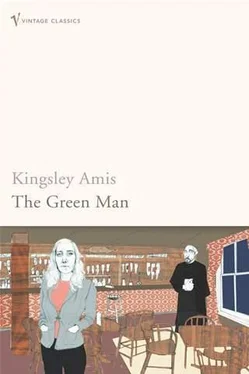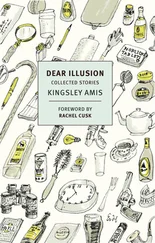Kingsley Amis - The Green Man
Здесь есть возможность читать онлайн «Kingsley Amis - The Green Man» весь текст электронной книги совершенно бесплатно (целиком полную версию без сокращений). В некоторых случаях можно слушать аудио, скачать через торрент в формате fb2 и присутствует краткое содержание. Жанр: Старинная литература, на английском языке. Описание произведения, (предисловие) а так же отзывы посетителей доступны на портале библиотеки ЛибКат.
- Название:The Green Man
- Автор:
- Жанр:
- Год:неизвестен
- ISBN:нет данных
- Рейтинг книги:5 / 5. Голосов: 1
-
Избранное:Добавить в избранное
- Отзывы:
-
Ваша оценка:
- 100
- 1
- 2
- 3
- 4
- 5
The Green Man: краткое содержание, описание и аннотация
Предлагаем к чтению аннотацию, описание, краткое содержание или предисловие (зависит от того, что написал сам автор книги «The Green Man»). Если вы не нашли необходимую информацию о книге — напишите в комментариях, мы постараемся отыскать её.
The Green Man — читать онлайн бесплатно полную книгу (весь текст) целиком
Ниже представлен текст книги, разбитый по страницам. Система сохранения места последней прочитанной страницы, позволяет с удобством читать онлайн бесплатно книгу «The Green Man», без необходимости каждый раз заново искать на чём Вы остановились. Поставьте закладку, и сможете в любой момент перейти на страницу, на которой закончили чтение.
Интервал:
Закладка:
‘Took a glass of small Ale to quench my thirst, & retir’d to my Chamber, & open’d Johannes à Ponte upon the Venom of Toads & Serpents, but found the matter phantastick beyond credence, & ill set out, & being much fatigu’d, (tho’ in ease of mind) took myself to my Bed.’
The Hobson Room seemed a good deal less cool than at first. I would have to have a drink soon—I had been mad not to bring a flask with me—but I had to put my thoughts in order first, or at least recite them to myself. Not in any order, then:
I did not know whether Underhill had really conjured up apparitions and noises and the rest of it, or even what that meant, but I believed that he and the girl thought he had, and the experience seemed to have been quite frightening enough to seal her mouth permanently, for I had never come across the least suggestion that he had gone in for any kind of sexual adventure. I could not remember the date of Mrs Underhill’s death, but fancied that it had been later than 1685, so that she had presumably been living in the house throughout this period, but without once being mentioned, not even in the entry I had just read. She must have known better than to interfere when she heard the girl’s screams. I understood how Joseph Thornton had been too much of a scholar to conceal the existence and location of Underhill’s diary, but too much of a moralist, or human being, not to warn his readers against it, and not to let it remain as hard to find as when he had managed to find it. Similar motives, the desire to preserve alongside the desire to thrust out of sight, must have worked on whoever had catalogued the diary seventy years before Thornton’s time. And I would have liked to do something about Widow Tyler’s daughter, but she had been dead for two and a half centuries, if not longer.
Ten minutes later, having been out and returned, I was eating a ham sandwich which I had coated with mustard-substitute from a tube, washing the result down with Scotch and bottled soda-water, and going on with the Underhill diary. By the time I was coming to the end of the year 1685, I became aware that the character of this was changing. The reading summaries became briefer, some works receiving no more than the notice that they were or were not useful to some ‘purpose’ kept in mind. At first, it seemed to me that this purpose had to do with the Tyler girl, who, also briefly, was described by Underhill as having ‘return’d to [his] Embraces’ every week or so, and/or with another girl called Ditchfield (I hated his way of ignoring their Christian names), aged twelve, whom he drew into his clutches in the first week of December, no doubt by a similar technique, though he was not very explicit about that. What had clearly been more interesting to Underhill at this stage was this long-term purpose of his, or, as it became in the entries for January 1686, his purposes. Maddeningly, just when I would have welcomed full information on the books he was reading, he started to mention nothing beyond authors and titles, often in a shortened form. I could do nothing with, for instance, ‘Geo sVerul.: Of spirits, & caet.’ beyond concluding that at any rate Underhill’s preoccupations had remained constant.
Then, at April 29th, 1686, I came to the following:
‘Must cast aside fleshy Delights, & all such Concerns (for the moment.) Have now refin’d my Method, whereby I may cease to take heed to those who trouble mee. The place is fit, (id est, v. dense, horrid, of much Verdure & Timber sufficient.) What I hold een now, w. due words deliver’d, will most assuredly secure me such Power, as never was seen in this Kingdom, not even in it’s Gothick or Saxon age, but only in the rude beginnings of our Folk, before the Ministry of Our Lord J.C., when men worshipt only Trees & Bushes, (in their silly Ignorance, or their Knowledge? Mem. to consider curiously upon this, & in time deliver Judgment.) I thank the chance that deliver’d this Engine to mee, & the Talent that empowers me to have learnt its true Employment.
‘As to my 2nd, & larger, I mean not larger but INFINITELY GREAT purpose, I will say nothing at the present, but this, Hee who knows my mind cannot but know too, & for certain, What is the lastg Repository where I have hid what will enable him to aid this purpose &, in process learn the Secret which will render him Master of Himself, & who is master of himself is master of every thing (vide Car sVoldemar Prov., Verum Ingenium).’
This almost filled up a right-hand page. When I turned over I found nothing more; the final twenty or thirty leaves of the notebook were blank. I poured more whisky and considered.
Thornton, as I had decided earlier, had not had the experience I had had in the wood above my house, and so had been unable to make anything of the reference to that wood on the last page of the diary. He must then have dismissed Underhill’s first purpose as too nebulous to be worth recording, possibly as empty vaunting or delusion. As regards the second purpose, Thornton had not, again, had the benefit of a conversation with Underhill’s ghost, as I had had, and could not have been expected to realize that this purpose had had to do with some form of survival after death. If Thornton had deduced the nature of the hiding-place referred to in the closing paragraph, he had no doubt been, as I could very well suppose from my reading of his book, too pious a man to contemplate disturbing the remains of a departed soul, even those of an ‘infamous creature’ like Thomas Underhill. I had no such inhibitions; and I was going to open that grave and coffin and see what ‘books and papers’ (as mentioned by Thornton) and other extras were to be found there.
As I sat on the hard scholar’s chair with the diary before me, I felt as elated and unsettled as I had done just before setting off today—more so. I see well enough now that a little more prudence would have been in order, but at the time I was revolted by the thought of prudence. Until Diana came along, I had had nothing to be more than trivially imprudent about for years, and never anything on this scale. There might even be something in—anyway, something interesting about—the supposed secret which was going to render me master of myself. I, of all people, could afford to learn that sort of secret. Not that I had forgotten what had become of the promises Underhill had made to the Tyler girl, and presumably to the Ditchfield girl also. These two, in fact, figured somehow in my motives for going on with the investigation, though I could not then have said how or how importantly.
But, talking of Diana … It was five-and-twenty to three, comfortable time to copy out Underhill’s last page, pack up and lock up here, return the key to Ware in the library, leave a thank-you note for Duerinckx-Williams at St Matthew’s lodge, drive down to Royston, have a furious argument there with the tiny wizened young man who supplied me with my drink and see to it that he would never again try to sell me pre-tax-increase stock at the increased price, go on to Fareham and the appointed corner and pick up Diana at three thirty.
That was just how it went. Diana’s questionings covered some of the same ground as those of the previous afternoon, eventually branching out into the general topic of what it was, or what I thought it was, that made men so different from women, by and large an easier assignment. Then, before we had quite reached the hollow on the hill, she started stripping with creditable speed. Everything was rather different from last time. When she was naked, and I was still stepping out of my trousers, she lay down on her back, stared at me and moved about a good deal on the ground. As soon as I reached her, she made it very clear that what the books used to call fore-play was not needed now; in fact, I had no chance to so much as kiss her until after the main stage of the whole business had been set in vigorous motion. It seemed to go on for hours, with Diana showing incredible energy. Whether this was natural or assumed I did not bother to wonder then, and quite right too. The distinction is in any case a doubtful one: orgasm itself is a reflex, but nothing much that accompanies even orgasm can be called so (let alone what people get up to during other parts of the performance). Nor did I ask myself whether Diana was reaching that point as often as her behaviour claimed, or indeed at all. That is not my way at such times, and even more quite right too. The mystery, the emotional secretiveness, the self-distancing of women, all the luggage of feeling they go about with and expect men to handle for them—these and countless more concrete manifestations start, not from the minor circumstance that women carry and bear and rear children, but from the fact that they do not have erections and do not ejaculate. (And, while we are about it, it is the fact that men do that deprives the passive homosexual’s role of any real depth or credibility.)
Читать дальшеИнтервал:
Закладка:
Похожие книги на «The Green Man»
Представляем Вашему вниманию похожие книги на «The Green Man» списком для выбора. Мы отобрали схожую по названию и смыслу литературу в надежде предоставить читателям больше вариантов отыскать новые, интересные, ещё непрочитанные произведения.
Обсуждение, отзывы о книге «The Green Man» и просто собственные мнения читателей. Оставьте ваши комментарии, напишите, что Вы думаете о произведении, его смысле или главных героях. Укажите что конкретно понравилось, а что нет, и почему Вы так считаете.











